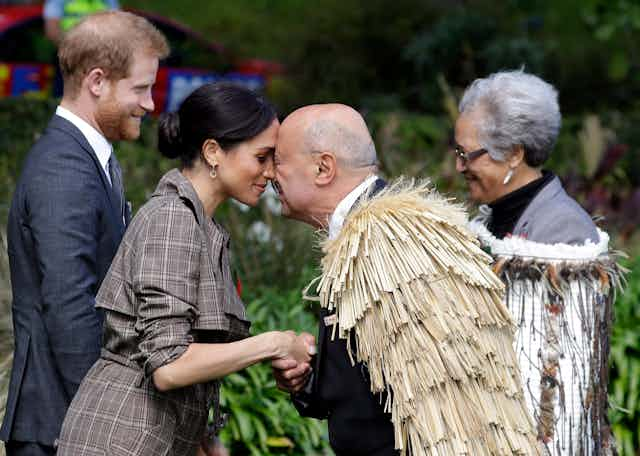The recent Supreme Court of Canada’s Mikisew Cree decision shows the complexities and limits of the Crown’s “duty to consult” over decisions affecting First Nations’ rights.
The fundamental democratic problem with the duty to consult is clear from an earlier Supreme Court ruling that called consultation an attempt to reconcile “the pre-existence of aboriginal societies with the sovereignty of the Crown.” The presumption here was that First Nations’ rights, including the right to participate in public decision-making, are burdens on Crown sovereignty.
Consultation also fails to reflect the substantive nation-to-nation relationship of Prime Minister Justin Trudeau’s policy rhetoric.
The duty to consult is limited. As Prof. Dwight Newman wrote recently in The Conversation Canada, the “court will not extend rules on the duty to consult to the development of legislation itself.”
Read more: What the Supreme Court ruling means for Indigenous consultation
This leaves a big void in Indigenous peoples’ opportunities to influence public policy-making.
Other countries don’t necessarily do things better, but there’s a strong case to be made for guaranteed participation of First Nations, not just consultation.
The meaning of Indigenous nationhood as it relates to Crown sovereignty preoccupies many post-settler societies.
In Australia, the state denies distinctive Indigenous nationhood. However, it has admitted that systematic Indigenous exclusion from policy-making has resulted in policy failure. It has accepted that consultation needs to be done better.
In New Zealand, however, the idea of a bicultural partnership between Māori and the Crown is well-established in legal and political discourse. Each must act towards the other in good faith.
Shareholders in public sovereignty
In all three countries, the assumption is that the Crown and Indigenous peoples form distinct political communities. The Crown is always the senior partner, because it’s the sovereign. However, if one takes the view that politically, at least, Crown sovereignty is the collective authority of a country’s citizens, including Indigenous people, then Indigenous political status changes.
They become shareholders in public sovereignty. They become participants, not partners. They become agents of their own aspirations, not objects of the duty to consult.
The idea that Indigenous peoples are simultaneously citizens of the post-settler state and citizens of their own nations suggests rethinking the “honour of the Crown” so that it is not simply the duty to consult with an adversary.
What should it be, then?
It should be the duty to supplement the rights and capacities that go with membership of an Indigenous nation with the ability to participate and influence public policy-making as an Indigenous person.
For some Indigenous people, the state’s colonial character is so entrenched and so destructive to their way of life that there is no moral justification to the argument that the state is legitimately and purposefully theirs to influence. However, an alternative perspective argued by New Zealand’s Justice Joe Williams, the first Māori speaker appointed to the country’s Court of Appeal, is that:
“Fundamentally, there is a need for a mindset shift away from the pervasive assumption that the Crown is Pākehā (Anglo-Celtic), English-speaking and distinct from Māori rather than representative of them. Increasingly, in the 21st century, the Crown is also Māori. If the nation is to move forward, this reality must be grasped.”
The Crown is Māori as much as it is anything else, because it is the repository of the people’s sovereignty.
Public sovereignty, not settler sovereignty
Māori share public sovereignty by electing members to parliament from designated Māori constituencies. They share that sovereignty by claiming more effective and culturally cognizant health and education systems, by contributing to the design and implementation of those systems, by calling out racism in public life.
These measures do not guarantee the right to self-determination. They have not created a public sovereignty that is always and everywhere positive, nor even just benign in its dealings with Māori. However, Māori rights are not dependent upon the Crown consulting with an adversary. They are advanced through participation.

In Australia, meantime, consultation occurs in haphazard and ineffective ways. The Indigenous claim to active participation is resisted by the state. However, that claim continues to be made with a determination that suggests slow but important progress.
In 2015, the Australian prime minister and the leader of the opposition appointed a body to consult on the terms of an amendment to the constitution to “recognize” Indigenous Australians. The consultation led to the Uluru Statement from the Heart, a claim to substantive and active participation in public affairs.
The statement proposed that the Australian constitution be amended to guarantee a permanent Indigenous representative body as an Indigenous “voice” to the national parliament.
All legislation would then be exposed to public Indigenous scrutiny. The representative body would not be able to block legislation, but it would ensure that Indigenous people would always have the institutional means to influence public debate.
‘Blistering critique’
Participation means that public institutions would be potentially influenced by Indigenous ways of decision-making and modes of engagement with others. As Mamari Stephens observed as a judge in a New Zealand law school mock trial, also known as a moot:
“Of the six mooters, four of the students mooted in Māori. Each of them was able to move fluidly between an unconscious ownership of the legal system and of tikanga Māori (Māori values and practices), and a blistering critique of the same systems. Just one small symbolic and up-ending moment of something better. There are other such moments waiting to coalesce.”
Self-determination requires consideration of deeper and more significant relationships between the citizen and the sovereign — including, perhaps, what the First Nations’ legal scholar Prof. John Borrows has called Canadian citizenship “under Aboriginal” influence.

